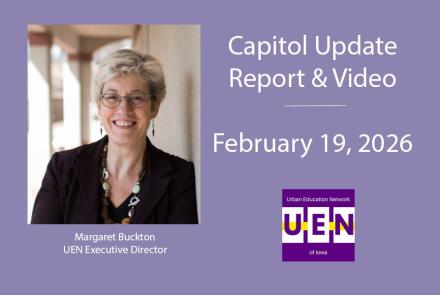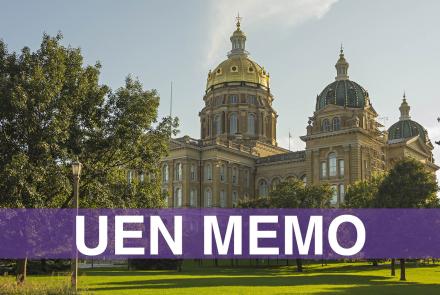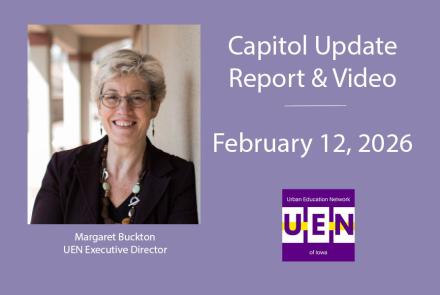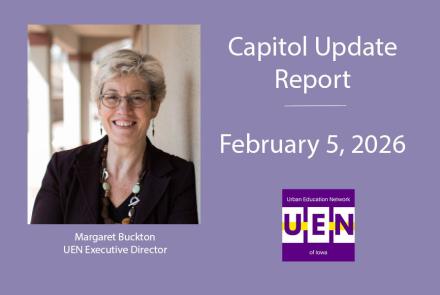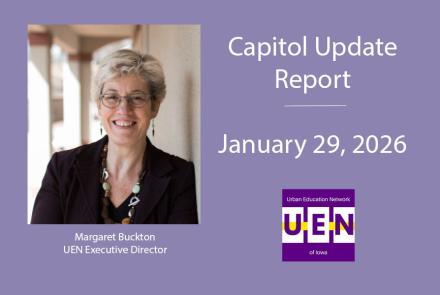Capitol Update - May 4, 2023
UEN Legislative Update
May 4, 2023
Download the printable version of UEN Weekly Report 05/04/2023
This UEN Weekly Report from the 2023 Legislative Session includes:
- Sine Die Resolution: End of the 2023 Session
- Policy Bills to the Governor: HF 604 Student Discipline Policies and HF 430 Mandatory Reporters and BOEE Membership
- Education and Standings Appropriations Bills
- HF 718 Property Tax Compromise
- Other Bills to (or signed by) the Governor
- What happens next?
- Dead Bills (Some worthy of note)
- Advocacy Action
Sine Die Resolution Adjourns the 2023 Session:
The House and Senate concluded work of the 2023 Session, adjourning just after noon on Thursday. The Sine Die (Latin) resolution means to adjourn without a time certain to return. Unless there is a need for a Special Legislative Session, they will not return until January 2024. They completed work on property tax reform, the state budget and several policy bills impacting education this week before the Session concluded.
Policy Bills to the Governor:
HF 604 Student Discipline Policies: the House concurred with the Senate Amendment, sending this bill to the Governor. The bill includes the following:
- Requires DE to produce a list of code/rule references for all required professional development (PD) and training. Requires school districts to notify staff of the state/federal requirement for the PD (including Chapter 284 Teacher Quality).
- Requires districts to give copy of Iowa Code 280.21 (Corporal Punishment) to teachers with an initial contract and annually with contract renewal.
- Requires the student handbook provided annually to parents of students including the discipline policy. Requires the parent to acknowledge receipt of the handbook, either in writing or electronically.
- Requires the state Ombudsman to investigate a complaint by a BOEE-licensed individual related to violence in the classroom, including retaliation regarding reporting. The Ombudsman must provide a report to DE & BOEE and keep the complainants’ identity secret.
- Requires classroom teachers to report threats or incidents of violence resulting in injury, property damage or assault by enrolled students to either the principal or a lead administrator within 24 hours. Allows the teacher to notify the parent of the offending student or the parent of a student threatened or injured. Requires principal/lead administrator to notify parents, of both offending student and student threatened or injured, within 24 hours after the classroom teacher reports the incident.
- Prohibits retaliation for disclosing information to any public official or law enforcement agency, including Ombudsman, if the employee/contractor reasonably believes the information evidences a violation of law, rule, mismanagement, gross abuse of funds, abuse of authority, or substantial and specific danger to public health or safety. Defines “disciplinary action”.
- Requires school boards to adopt, in collaboration with teachers and administrative staff, policies for different grade levels describing how the district may discipline a student for a threat of violence or causing such an incident. Requires board policy to include the following:
- Strategies designed to correct the student’s behavior.
- Provide for parent conference, counseling or mental health counseling sessions, when appropriate, including prior written parent consent for MH counseling.
- Must be consistent with special education law.
- Provide for escalating levels of discipline.
- Allows the district to select the appropriate level of discipline corresponding to the severity of the incident.
- Allows districts to suspend the student, permanently remove the student from a particular class, expel, or place student in an alternative learning environment, including a therapeutic classroom if appropriate and available.
- Requires an IEP meeting if offending student has an IEP.
- Requires the district to publish the policy on the school district’s website.
The bill as amended, was approved in the Senate, 49:0, and House concurred 94:0. UEN was registered opposed to the original House bill, but changed our registration to undecided with the Senate amendment. The bill goes to the Governor.
HF 430 Mandatory Reporter and BOEE Board Make-up: this bill was amended and approved in the Senate, then the House concurred, sending it to the Governor. The bill establishes a process for investigations of employee conduct, hiring practices and changes the membership of the Board of Education Examiners, including the following provisions:
- Requires school employees to be mandatory reporters for children of all ages and applies to all employees over age 18 (includes charter schools).
- Requires DE to develop and implement a process for reporting and investigating an employee’s commission of a felony or violation of IC 272.15 (1) “a” regarding inappropriate relationship or contact with a student. Requires this process to:
- Prohibit written or oral agreements between school districts and employees which prohibits the employer from discussing any employee behavior or incidents with officials or prospective employers as a condition of resigning.
- Prohibit a written or oral agreement that waives liability of a licensed employee related to or arising from an incident, past performance, action or allegations of wrongdoing.
- Requires districts to provide all documentation and info related to the incident to BOEE for investigation if the employee resigns or the contract is terminated.
- Requires districts to complete an investigation for unlicensed employees no longer working for the district.
- Requires the district to review an applicant’s employment history, including contacting the applicant’s previous employers listed on the application for employment and by viewing the BOEE’s public license information to determine if there is a case pending with a finding of probable cause or any licensure sanction.
- Requires district to keep information on forms prescribed by DE and respond to any request from a potential employer (but not required to reveal information about unfounded, closed investigations. Gives school leaders immunity from criminal or civil liability arising from disclosure as long as the information is not knowingly false.
- Requires BOEE to conduct a hearing if a licensed employee fails to follow this process or intentionally conceals information from any governmental agent, officer or potential employer.
- Requires an annual report by BOEE to the General Assembly with the number and types of disciplinary hearings, trends, investigations related to administrators reporting of incidents or following this process.
- Requires BOEE to finalize an investigation even if the practitioner resigns or surrenders their license.
- Requires BOEE to adopt rules that:
- require collection and retention of written complaints. If complaint is unfounded, requires all records associated with it be kept confidential.
- notify the public if an ongoing investigation has a case pending with a finding of probable cause. (BOEE is not required to disclose unfounded, closed investigations.)
- evaluate unfounded complaints if similar complaints are filed against the same practitioner.
- require BOEE to investigate an administrator of a school that employs a licensed practitioner subject to investigation involving reporting of an employee incident, requiring the board to investigate whether the administrator failed to file a required written complaint or report to the BOEE.
- BOEE Membership is increased to 13 members:
- four are members of the general public with an interest in education but not a license, and two of the four are parents and one of those two shall have been or is a school board member.
- eight members are licensed practitioners, three of these must be administrators and one must be from a nonpublic school. Remaining four are selected from among elementary or secondary teachers, special education teachers, counselors/special purpose practitioners, school service personnel.
- one member shall be the DE director or designee.
- Additional language specifies terms, quorum and other necessary conforming changes.
The bill was amended and passed the Senate, 48:0, was approved in the House 92:1, and is awaiting the Governor’s signature. UEN was opposed to the original bill, but with the passage of the Senate amendment, is now registered in support.
Education and Standings Appropriations Bills:
SF 560 Education Appropriations: the line-item appropriations in this bill are mostly status quo appropriations equaling the FY 2023 level but for a few differences. The overall package increase was 2.65%. Community Colleges received 3.25% increase. Notable items include:
- I-JAG (Iowa Jobs for America’s Graduates): $9.1 million, which is an increase of $1 million for the IJAG program (12% increase over last year).
- No increase for Therapeutic Classrooms or Mental Health services/training through AEAs or for early childhood programs.
- Eliminates $852,000 for nonpublic school textbooks
- Repeals the existing online job posting system and requires Workforce Development, in consult with DE, to create an internet site for posting jobs openings. Requires DE, school districts, charter schools and AEAs to submit all job openings to the site. Allows accredited nonpublic schools to submit job openings to post.
- DE is to convene a task force to study funding for At-Risk students and DoP. Must Consider:
- how schools currently use state funding for programs for at-risk and DoP (note: DoP is locally funded not state-funded, while At-Risk funding is through the formula),
- the effectiveness of such programs,
- whether and to what extent state funds should be reallocated to Jobs for America's Graduates (iJAG),
- how to best utilize state funding for at-risk and DoP programs.
- Report of the task force is due to the General Assembly by Dec. 31, 2023.
The bill was approved in the Senate, 34:16. The House passed it 59:33. It is awaiting the Governor’s signature. UEN is registered as undecided.
SF 578 Standing Appropriations: makes changes to appropriations that would otherwise stand as previously enacted. The following provisions impact schools:
- Limits the FY 2024 General Fund appropriation to the DE for nonpublic school transportation to $9.0 million. Requires the appropriation to be prorated if the claims exceed the appropriation.
- Suspends the General Fund FY24 standing appropriation of $14.8 million to DE for the Instructional Support Program. (The State has contributed no state funding to ISL since 2011.)
- Reduces the FY 2024 State school aid funding to AEAs by $22.1 million. (There is an additional $7.5 million statutory cut, so total is $29.6 million, which cuts $5 million deeper than in FY 2023).
- Does not mention the $10 million high-needs schools grants. We will sift through the final legislation and make sure no other actions impacted this appropriation. If this stands, this would be the first time since the 2013 Education Reform Act first created this appropriation that it is funded.
The bill was approved by the Senate 31:16. The House approved it 55:38, sending it to the Governor. UEN registered opposed to the division cutting the AEAs.
HF 718 Property Tax Compromise
The House and Senate came to a compromise on property tax reform. The compromise includes the following:
- Changes budget certification for schools from April 15 to April 30.
- Changes budget appeal deadline from April 25 to May 10.
- Prohibits any new Public Education and Recreation Levy (PERL) votes but does not impact those currently in place.
- Creates a Taxpayer Statement that must be mailed to taxpayers and requires a public hearing on that notice. Schools must submit the information to Department of Management (DOM) by March 15.
- Taxpayer statements are provided to county auditors by DOM and required to be mailed to property owners by March 20.
- An additional public hearing must be held prior to adoption of the school district budget (follow normal publication 10 to 20 day window).
- Taxpayers can submit comments at the hearing or in writing.
- Taxing authority can reduce levies at this point, but is prohibited from increasing levies.
- Must provide proof of publication of public hearing notice to county auditor.
- The regular public hearing on the budget must still occur after the taxpayer statement hearing.
- Taxpayer statements are required to include the following:
- Tax levy and tax rate for current fiscal year.
- Effective property tax rate for the subdivision.
- Property tax dollars for the budget year and the tax rate.
- If the budget year amounts are higher, a detailed statement of the major reasons for the increase and the specific program or purpose.
- Example with a residential property of $100,000 value.
- Example of a commercial property of $100,000 value.
- School’s percentage of total property taxes.
- Detailed explanation of reason for increase if greater than last year.
- Date and time of this public hearing.
- Public hearing is required per the date and time published in the taxpayer statement. The public hearing must allow oral and written testimony from residents or property owners. The public hearing must be separate from any other meeting on budget or any other school district purpose.
- Bond issue elections will only be allowed during November elections (includes all Novembers, not just during the school board election).
- Auditor must send not less than 10 nor more than 20 days prior to the bond election, to each registered voter, a notice of election that includes the full text of the public measure to be voted on.
- Establishes a new Homestead tax exemption in addition to the homestead credit for an owner that has attained the age of sixty-five years by January 1 of the assessment year, with the exemption equal to $3,250 additional exemption for Jan. 1, 2023 assessments, which increases to $6,500 additional exemption for Jan. 1, 2024 assessments. Establishes a new military exemption of $4,000. The estimated impact of these two exemptions was stated as $100 million. No Fiscal note has yet been published for the updated bill.
- The bill in its final form does not lower the uniform school levy or limit growth of every taxing parcel to no more than 3%.
The Senate approved the bill 49:0. The House agreed 94:1. Governor Reynolds signed it on May 5, 2023. UEN was registered opposed to the original House file.
Other Bills to (or signed by) the Governor:
- HF 256 Age of Licensure: lowers the minimum age of applicants for licenses from BOEE from 21 to 18 years. The Governor signed it on May 3. UEN supports.
- HF 602 Suicide Hotline: requires school districts to publish the phone number and website of a suicide hotline on Student ID Cards for grades 7-12 and may include them on ID cards for students in grades 5-6. Allows but does not require districts to use up existing card stock before being required to include the information. The Senate passed the bill 48:0, the House concurred 94:1, sending it to the Governor. UEN is registered in support.
- HF 614 Licensure Reciprocity: requires BOEE to license individuals from other states or nations who have completed the necessary coursework to be licensed in the other state/county, even if they did not have a passing score on a test such as the PRAXIS. The Senate approved the bill, sending it to the Governor. UEN is registered in support.
- SF 250 Computer Science PD allows expenditure of funds through Sept. 1. Signed by the Governor May 3, 2023. UEN is registered in support.
- HF 256 BOEE Licensure Age: lowers the minimum age of applicants for licenses from BOEE from 21 to 18. Signed by the Governor. UEN is registered in support.
- HF 614 Licensure Reciprocity: requires BOEE to license individuals from other states or nations who have completed the necessary coursework to be licensed in the other state/county, even if they did not have a passing score on the PRAXIS. To the Governor. UEN is registered in support.
- HF 672 MA+ Permanent Teacher License: allows a permanent license for teachers with masters’ degree or higher and at least 10 years of experience without CEUs contingent on a background check. Applies the background check requirements to accredited private schools. Still requires evaluator licensure update every 10 years. Approved by the House 98:0, by the Senate 49:0 and sent to the Governor. UEN is registered in support.
What Happens Next?
The Governor has 30 days to sign or veto (or line-item veto appropriations) bills sent to her this last week. It will take some time for them all to become enrolled and get to her desk. There will be some administrative rules that must be written, some procedures and models development, some guidance pending. Expect updates through the summer as we learn more.
UEN will publish the UEN 2023 Legislative Digest detailing every action of this Session impacting schools after the Governor completes her work. In the meantime, after a brief rest, advocacy will begin anew for the 2024 Session.
Dead Bills (Some Worthy of Note)
The 2023 Session was the first Session of the Biennium, so all bills introduced this Sessions will start the 2024 Session eligible for consideration. There are hundreds of bills in this category, which will be listed in our UEN bill tracking on the website soon. Here are some worthy of mention:
- SF 246 Dropout Prevention Equity: UEN supports.
- SF 251 Administration Expenditure Limitation: UEN opposes.
- SF 392 Teacher Recruitment/Retention Omnibus that has management fund for recruiting/retention plans: UEN supports.
- SF 393 Interim School Finance Committee: UEN supports.
- SF 543 Guns on School Grounds: UEN opposes.
- SF 546 Electronic Notices: UEN supports.
- SF 570 Clean-up and Tax Credit Changes to ESAs: UEN supports.
- HF 297 PK Weighting 1.0 for low income: UEN supports.
- HF 477 Poverty Work Group: UEN supports.
One More Advocacy Action In a Week or Two:
- Say Thank You. Send a thank you note for some policy UEN supported that helps your district. If you can’t find any votes to thank them for, send them a note of thanks for representing your district and offer to connect over the Interim on issue important to your school and students. Wait for the Legislative Digest for all of the details. It’s OK to share the Digest with legislators.
Connecting with Legislators during the Interim: legislators typically use home email, address and phones while not in Session. If you aren’t sure how best to reach them, send them a note in the mail to their home address and just ask.
THANK YOU UEN ADVOCATES!!! THANK YOU for your constant and enthusiastic contacts with legislators. If you go back and read the bill descriptions of bills introduced, then compare to the final form, you’ll see what a difference advocacy makes.
Contact us with any questions, feedback or suggestions to better prepare your advocacy work:
Margaret Buckton
UEN Executive Director/Legislative Analyst
margaret@iowaschoolfinance.com
515.201.3755 Cell
Thanks to our UEN Corporate Sponsors
Special thank you to your UEN Corporate Sponsors for their support of UEN programs and services. Find information about how these organizations may help your district on the Corporate Sponsor page of the UEN website at www.uen-ia.org/uen-sponsors.
|
|


